04 Apr 18 | Magazine, Magazine Contents, Volume 47.01 Spring 2018
[vc_row][vc_column][vc_custom_heading text=”With contributions from Omar Mohammed, Mahvash Sabet, Simon Callow and Lucy Worsley, as well as interviews with Neil Oliver, Barry Humphries and Abbad Yahya”][/vc_column][/vc_row][vc_row][vc_column][vc_column_text]
The spring 2018 issue of Index on Censorship magazine takes a special look at how governments and other powers across the globe are manipulating history for their own ends.
In this issue, we examine the various ways and areas where historical narratives are being changed, including a Q&A with Chinese and Japanese people on what they were taught about the Nanjing massacre at school; the historian known as Mosul Eye gives a special insight into his struggle documenting what Isis were trying to destroy; and Raymond Joseph takes a look at how South Africa’s government is erasing those who fought against apartheid.
The issue features interviews with historians Margaret MacMillan and Neil Oliver, and a piece addressing who really had free speech in the Tudor Court from Lucy Worsley.
[/vc_column_text][/vc_column][/vc_row][vc_row][vc_column][vc_single_image image=”99222″ img_size=”full”][/vc_column][/vc_row][vc_row][vc_column][vc_column_text]
We also take a look at how victims of the Franco regime in Spain may finally be put to rest in Silvia Nortes’ article; Irene Caselli explores how a new law in Colombia making history compulsory in school will be implemented after decades of conflict; and Andrei Aliaksandrau explains how Ukraine and Belarus approach their Soviet past.
The special report includes articles discussing how Turkey is discussing – or not – the Armenian genocide, while Poland passes a law to make talking about the Holocaust in certain ways illegal.
Outside the special report, Barry Humphries aka Dame Edna talks about his new show featuring banned music from the Weimar Republic and comedian Mark Thomas discusses breaking taboos with theatre in a Palestinian refugee camp.
Finally, we have an exclusive short story by author Christie Watson; an extract from Palestinian author Abbad Yahya’s latest book; and a poem from award-winning poet Mahvash Sabet.
[/vc_column_text][/vc_column][vc_column][/vc_column][/vc_row][vc_row][vc_column][vc_custom_heading text=”Special report: The abuse of history “][vc_column_text]
A date (not) to forget, by Louisa Lim: The author on why her book about Tiananmen would be well-nigh impossible to research today
Who controls the past controls the future…, by Sally Gimson: Fall in line or be in the firing line is the message historian are receiving from governments around the world
Another country, by Luka Ostojić: One hundred years after the creation of Yugoslavia, there are few signs it ever existed in Croatia. Why?
No comfort in the truth, by Annemarie Luck: It’s the episode of history Japan would rather forget. Instead comfort women are back in the news
Unleashing the past, by Kaya Genç: Freedom to publish on the World War I massacre of Turkish Armenians is fragile and threatened
Stripsearch, by Martin Rowson: Mister History is here to teach you what really happened
Tracing a not too dissident past, by Irene Caselli: As Cubans prepare for a post-Castro era, a digital museum explores the nation’s rebellious history
Lessons in bias, by Margaret MacMillan, Neil Oliver, Lucy Worsley, Charles van Onselen, Ed Keazor: Leading historians and presenters discuss the black holes of the historical universe
Projecting Poland and its past, by Konstanty Gebert: Poland wants you to talk about the “Polocaust”
Battle lines, by Hannah Leung and Matthew Hernon: One battle, two countries and a whole lot of opinions. We talk to people in China and Japan about what they learnt at school about the Nanjing massacre
The empire strikes back, by Andrei Aliaksandrau: Ukraine and Belarus approach their former Soviet status in opposite ways. Plus Stephen Komarnyckyj on why Ukraine needs to not cherry-pick its past
Staging dissent, by Simon Callow: When a British prime minister was not amused by satire, theatre censorship followed. We revisit plays that riled him, 50 years after the abolition of the state censor
Eye of the storm, by Omar Mohammed: The historian known as Mosul Eye on documenting what Isis were trying to destroy
Desert defenders, by Lucia He: An 1870s battle in Argentina saw the murder of thousands of its indigenous people. But that history is being glossed over by the current government
Buried treasures, by David Anderson: Britain’s historians are struggling to access essential archives. Is this down to government inefficiency or something more sinister?
Masters of none, by Bernt Hagtvet: Post-war Germany sets an example of how history can be “mastered”. Poland and Hungary could learn from it
Naming history’s forgotten fighters, by Raymond Joseph: South Africa’s government is setting out to forget some of the alliance who fought against apartheid. Some of them remain in prison
Colombia’s new history test, by Irene Caselli: A new law is making history compulsory in Colombia’s schools. But with most people affected by decades of conflict, will this topic be too hot to handle?
Breaking from the chains of the past, by Audra Diptee: Recounting Caribbean history accurately is hard when many of the documents have been destroyed
Rebels show royal streak, by Layli Foroudi: Some of the Iranian protesters at recent demonstrations held up photos of the former shah. Why?
Checking the history bubble, by Mark Frary: Historians will have to use social media as an essential tool in future research. How will they decide if its information is unreliable or wrong?
Franco’s ghosts, by Silvia Nortes: Many bodies of those killed under Franco’s regime have yet to be recovered and buried. A new movement is making more information public about the period
[/vc_column_text][/vc_column][/vc_row][vc_row][vc_column][vc_custom_heading text=”Column”][vc_column_text]
Global view, by Jodie Ginsberg: If we don’t support those whose views we dislike as much as those whose views we do, we risk losing free speech for all
[/vc_column_text][/vc_column][/vc_row][vc_row][vc_column][vc_custom_heading text=”In focus”][vc_column_text]
How gags can remove gags, by Tracey Bagshaw: Comedian Mark Thomas discusses the taboos about stand-up he encountered in a refugee camp in Palestine
Behind our silence, by Laura Silvia Battaglia: Refugees feel that they are not allowed to give their views in public in case they upset their new nation, they tell our interviewer
Something wicked this way comes, by Abigail Frymann Rouch: They were banned by the Nazis and now they’re back. An interview with Barry Humphries on his forthcoming Weimar Republic cabaret
Fake news: the global silencer, by Caroline Lees: The term has become a useful weapon in the dictator’s toolkit against the media. Just look at the Philippines
The muzzled truth, by Michael Vatikiotis: The media in south-east Asia face threats from many different angles. It’s hard to report openly, though some try against the odds
Carving out a space for free speech, by Kirsten Han: As journalists in Singapore avoid controversial topics, a new site launches to tackle these
[/vc_column_text][/vc_column][/vc_row][vc_row][vc_column][vc_custom_heading text=”Culture”][vc_column_text]
Just hurting, not speaking, by Christie Watson: Rachael Jolley interviews the author about her forthcoming book, why old people are today’s silent community and introduces a short story written exclusively for the magazine
Ban and backlash create a bestseller, by Abbad Yahya: The bestselling Palestinian author talks to Jemimah Steinfeld about why a joke on Yasser Arafat put his life at risk. Also an extract from his latest book, translated into English for the first time
Ultimate escapism, by Mahvesh Sabet: The award-winning poet speaks to Layli Foroudi about fighting adversity in prison. Plus, a poem of Sabet’s published in English for the first time
[/vc_column_text][/vc_column][/vc_row][vc_row][vc_column][vc_custom_heading text=”Column”][vc_column_text]
Index around the world, by Danyaal Yasin: Research from Mapping Media Freedom details threats against journalists across Europe
[/vc_column_text][/vc_column][/vc_row][vc_row][vc_column][vc_custom_heading text=”Endnote”][vc_column_text]
Frightening state, by Jemimah Steinfeld: States are increasing the use of kidnapping to frighten journalists into not reporting stories
[/vc_column_text][/vc_column][/vc_row][vc_row content_placement=”top”][vc_column width=”1/3″][vc_custom_heading text=”The Abuse of History” font_container=”tag:p|font_size:24|text_align:left” link=”url:https%3A%2F%2Fwww.indexoncensorship.org%2F2017%2F12%2Fwhat-price-protest%2F%20|||”][vc_column_text]The spring 2018 issue of Index on Censorship magazine takes a special look at how governments and other powers across the globe are manipulating history for their own ends
With: Simon Callow, Louisa Lim, Omar Mohammed [/vc_column_text][/vc_column][vc_column width=”1/3″][vc_single_image image=”99222″ img_size=”medium” alignment=”center” onclick=”custom_link” link=”https://www.indexoncensorship.org/2017/12/what-price-protest/”][/vc_column][vc_column width=”1/3″ css=”.vc_custom_1481888488328{padding-bottom: 50px !important;}”][vc_custom_heading text=”Subscribe” font_container=”tag:p|font_size:24|text_align:left” link=”url:https%3A%2F%2Fwww.indexoncensorship.org%2Fsubscribe%2F|||”][vc_column_text]In print, online. In your mailbox, on your iPad.
Subscription options from £18 or just £1.49 in the App Store for a digital issue.
Every subscriber helps support Index on Censorship’s projects around the world.
 SUBSCRIBE NOW[/vc_column_text][/vc_column][/vc_row]
SUBSCRIBE NOW[/vc_column_text][/vc_column][/vc_row]
20 Mar 18 | News and features, Russia
[vc_row][vc_column][vc_single_image image=”98826″ img_size=”full” add_caption=”yes” alignment=”center”][vc_column_text]
This article by Sergey Smirnov, editor-in-chief of MediaZona, was originally published at openDemocracy Russia.
The poisoning of Sergey Skripal has led to a sharp deterioration in UK-Russia relations. For now, London’s official moves, such as deporting 23 Russian diplomats and searching planes inbound from Russia, look moderate. But Boris Johnson’s statement on 16 March was likely unexpected for Moscow. The British foreign minister came to the conclusion that Vladimir Putin sanctioned the attack on Skripal too quickly, though the Kremlin has, for now, merely commented that Johnson’s tone was “unacceptable”.
Immediately after the attack, the British parliament began discussing possible responses to Moscow. One of the first proposals was to stop the Russia Today TV channel, which is financed by the Russian government and is openly involved in propaganda, from broadcasting in the UK. And here it’s important to understand that British MPs have raised an important topic — one that’s painful not just for the Kremlin, but the whole of Russian society, including the opposition.
Banning the Russian propaganda channel in the UK will provoke a predictable reaction in Moscow. And London needs to understand beforehand what will happen (though the Kremlin hasn’t particularly hidden its intentions). First, Maria Zakharova, spokesperson for Russia’s Foreign Ministry, then Margarita Simonyan, head of RT, made it clear: all British media will be banned in response. This will concern first and foremost the BBC. It’s unclear what will happen to the work of other British media in Russia.
The Kremlin brought independent media in Russia under control long ago. If they managed to deal with television by the mid-2000s, then the internet didn’t really attract the attention of the Russian authorities for some time after. But in recent years the pressure has increased: independent media are often brought under control via oligarchs loyal to the Kremlin. For big internet publications, every year it gets harder to work. High-class independent journalists are fired if they choose not to betray their principles. Meanwhile, the authorities aren’t in a rush to pressure foreign media working in Russia.
Here, it’s important to explain the actions of the Russian authorities, which have been and will be demonised quite enough. The issue is that Vladimir Putin and his team don’t have — and have never had — a clearly worked-out programme to destroy democracy, including freedom of speech. As a rule, all their decisions are situative. Russian television was taken under control after Putin was sharply criticised by the oligarchs Boris Berezovsky and Vladimir Gusinsky. The Russian president likes to act in response to any threats.
Take the events of the past six years. In 2011, hundreds of thousands of people, dissatisfied with the prospect of Putin returning to power, came onto the streets of Russian cities. The protest was suppressed, but the Russian authorities were seriously worried. They set themselves the task of makingeverything dependent on them, in order to ensure these scenes would never be repeated. The authorities undertook various actions: from formally liberalising the political sphere to passing repressive laws at the very moment when people stopped protesting.
Once again, it’s important to understand that the Kremlin’s reaction was a response to street protest. Although these laws may have been prepared beforehand, it seems they were thought up on the spot. Take the “Foreign Agents” law as an example — this law banned NGOs which take foreign funds from being involved in “political activity”. As is often the case in Russia, this law didn’t only touch on the work of human rights organisations, but many others, from environmental NGOs to, most recently, a diabetes society.
Why did they pass this law? Because the authorities believed that the 2011-2012 protests were organised from abroad. The mass protest started after election observers found large-scale falsifications at the parliamentary elections. The Golos election monitoring association prepared the observers. Golos received foreign funding. This is how the Kremlin put it together.
A similar situation happened with the Kremlin’s response to Ukraine. Putin was sure that he was simply responding to attempts by the west to take Ukraine further from Moscow’s influence — and, at the same time, breaking Putin’s agreements with Viktor Yanukovych. The 2012 ban on adopting Russian children (the “Dima Yakovlev” law) was also perceived as a response to hostile actions from the west.
Here, I’m trying to explain the Kremlin’s logic, which becomes even clearer in the case of Russia Today in the US. After RT was registered under the Foreign Agent Registration Act in November last year, Moscow started feverishly searching for return measures. The initial suggestions were more reminiscent of North Korea, e.g. banning all independent media, including social networks and even the internet. But then the Kremlin softened its position. All US media, which receive state financing, were declared foreign agents. Other US media have yet to fall under this law’s purview.
For me, there’s two reasons for this. The first, as I wrote above, is that the Kremlin is convinced that it’s defending itself from attacks. It has to respond. The second is that Moscow still leaves itself room for manoeuvre and bargaining. If you ban everything at once, there’s nothing to discuss further — and the Kremlin doesn’t want to end up isolated like North Korea. But the risk of isolation has risen after the Skripal poisoning, and the Russian authorities see this. They won’t make any sudden moves on their own.
This is what western states need to understand about the Kremlin’s behaviour. Currently, there’s no signs that Putin will change his traditional tactics after re-election. The Russian authorities will still monitor the domestic opposition and the actions of the west (and will respond to them). The west needs to understand that the Kremlin’s reaction vis-a-vis freedom of speech and human rights depends on their reaction. Not least of all because the Russian authorities love appealing to the west’s double standards. All actions in connection with RT are seen as the west’s hypocrisy in the field of freedom of speech.
By banning Russian propaganda, the western world helps Putin in his fight against freedom of speech.
[/vc_column_text][/vc_column][/vc_row][vc_row][vc_column][vc_basic_grid post_type=”post” max_items=”4″ element_width=”6″ grid_id=”vc_gid:1521550689819-572c0ade-65d6-1″ taxonomies=”15″][/vc_column][/vc_row]
16 Mar 18
[vc_row full_width=”stretch_row_content_no_spaces” full_height=”yes” content_placement=”middle” css_animation=”fadeIn” css=”.vc_custom_1521806157541{margin-top: 0px !important;background-image: url(https://www.indexoncensorship.org/wp-content/uploads/2018/03/MMF_2017_web-cover.jpg?id=98589) !important;background-position: center !important;background-repeat: no-repeat !important;background-size: contain !important;}”][vc_column][/vc_column][/vc_row][vc_row css_animation=”fadeIn” css=”.vc_custom_1521805928920{margin-top: 0px !important;}”][vc_column][vc_row_inner][vc_column_inner][vc_column_text]
The case of Maltese journalist Daphne Caruana Galizia, who had for years worked to shine a light on corruption among politicians, businessmen and criminals in Malta, highlights the dire need for a free press. Between 2016 and 2017 Caruana Galizia linked the Maltese political elite to the Panama Papers, including the financial affairs of the prime minister, his wife and the leader of the country’s opposition party.
For her work, she paid with her life when a bomb exploded under her car on 16 October. She was not the only journalist to be murdered in Europe in 2017, nor were violations of media freedom confined to any one region.
Mapping Media Freedom has been recording threats to press freedom since 2014, highlighting the need for protection for journalists. The project monitors the media environment in 42 European and neighbouring countries. In 2017 1,089 reports of limitations to press freedom were verified by a network of correspondents, partners and other sources based in Europe, with a majority of violations coming from official or governmental bodies.
Six journalists were killed during 2017; 178 reports of assault or injury were made; 220 media workers were detained or arrested; 193 reports included criminal charges and lawsuits; there were 367 reports of intimidation, which includes psychological abuse, sexual harassment, trolling/cyberbullying and defamation; in 113 incidents media professionals had their property vandalised or confiscated; there were 178 instances of journalists or sources being blocked; and journalists’ work was altered or censored 68 times.
“While the number of incidents reported to Mapping Media Freedom decreased between 2016 and 2017, this should not be taken as an indication that the work environment for journalists has improved in the countries monitored by the platform,” Hannah Machlin, project manager of Mapping Media Freedom, said. “Media professionals still work under threat of death, assault, prison and harassment, while the law is being abused as a means to silence those who seek to tell the truth.”
ABOUT MAPPING MEDIA FREEDOM
Each report is fact-checked with local sources before becoming publicly available on Mapping Media Freedom. The number of reports per country relates to the number of incidents reported to the map. The data should not be taken as representing absolute numbers. For example, the number of reported incidents of censorship appears low given the number of other types of incidents reported on the map. This could be due to an increase in acts of intimidation and pressure that deter media workers from reporting such cases.
The platform – a joint undertaking with the European Federation of Journalists partially funded by the European Commission – covers 42 countries, including all EU member states, plus Albania, Bosnia and Herzegovina, Iceland, Kosovo, Macedonia, Montenegro, Norway, Serbia, Turkey, along with Russia, Belarus and Ukraine (added in April 2015), and Azerbaijan (added in February 2016). The database uses Ushahidi, an open source software to map and categorise incidents.
[/vc_column_text][/vc_column_inner][/vc_row_inner][/vc_column][/vc_row][vc_row equal_height=”yes”][vc_column][vc_custom_heading text=”Deaths” use_theme_fonts=”yes”][vc_column_text]
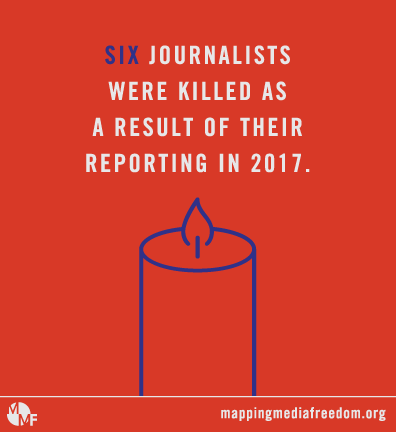 Six journalists were killed as a result of their reporting in 2017.
Six journalists were killed as a result of their reporting in 2017.
Q1: In Russia on 9 March, two unknown individuals approached Nikolai Andrushchenko, an investigative journalist for the weekly newspaper Novyi Petersburg, near his home in St. Petersburg and demanded that he surrender documents and materials from his ongoing investigation into abuses of power by police officers. After the journalist refused, he was physically assaulted by the assailants, who were not apprehended. Andrushchenko refused to file a complaint with the police. A second assault took place a few days later, after which he was found unconscious near his apartment. The journalist never regained consciousness and, following brain surgery, died in hospital as a result of his injuries on 19 April.
On 16 March, in Ulan-Ude, Russia, Yevgeny Khamaganov, the editor-in-chief of Asia-Russia Daily and The Site of the Buryat People died in unexplained circumstances. The cause of death is unclear and no official response has been made. According to local media, Khamaganov was taken to hospital on 10 March because of his diabetes, fell into a coma and died several days later. Some reports cited speculation that he was instead hospitalised after being beaten by unknown assailants. Khamaganov was known for articles critical of the Russian federal government’s policies.
Q2: In Minusinsk, Russia, journalist Dmitri Popkov, editor-in-chief and founder of local newspaper Ton-M, was shot five times and killed on 24 May. His body was found in a sauna in his backyard. Prior to his death, Popkov had told RFE/RL that his newspaper became “an obstacle” for local officials who are now “threatening and intimidating journalists”.
Q3: On 10 August Swedish freelance journalist Kim Wall boarded an experimental submarine in Copenhagen, Denmark, to profile the vessel’s Danish inventor. The following morning, the submarine sank under suspicious circumstances. Peter Madsen, the inventor, told police he had set Wall ashore before the incident. However, between August and October, Wall’s dismembered remains were found washed ashore. Madsen has been charged with the journalist’s murder and with sexual assault.
On 22 September Syrian journalists Orouba Barakat and her daughter Halla Barakat were found dead in their apartment in Istanbul, Turkey. The exact date of the murders is unknown. Orouba Barakat, a journalist, filmmaker and activist, was outspokenly critical of the Syrian regime. Her daughter was a reporter for Alekhbarya TV, news editor for the Orient and a former editor at Turkish state channel TRT World. The pair had received threats from groups associated with the Syrian government. Police reports said they were strangled and then stabbed. The murders are still being investigated by police.
Q4: Maltese journalist Daphne Caruana Galizia was killed when the car she was driving exploded in Bidnija, near Mosta. Caruana Galizia had filed a police report 15 days earlier saying she was being threatened. The journalist had conducted a series of high-profile corruption investigations in Malta and was being sued in relation to her work.
One additional media worker was killed in 2017. On 29 April Saeed Karimian, an Iranian television executive, was shot and killed along with his partner in Istanbul, Turkey.
[/vc_column_text][/vc_column][/vc_row][vc_row][vc_column][vc_custom_heading text=”Physical assaults and injury” use_theme_fonts=”yes”][vc_column_text]
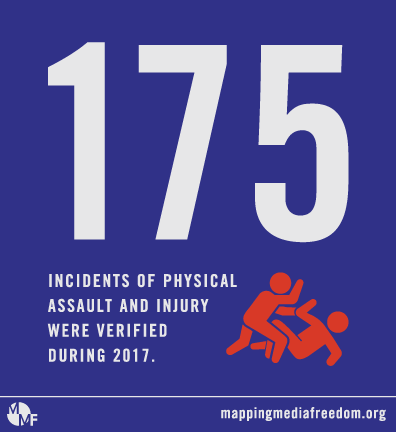 Mapping Media Freedom documented 175 verified incidents of assault and injury, 109 of which occurred in just five countries: Russia (47), Spain (19), Ukraine (18), Italy (15) and France (10).
Mapping Media Freedom documented 175 verified incidents of assault and injury, 109 of which occurred in just five countries: Russia (47), Spain (19), Ukraine (18), Italy (15) and France (10).
On 14 September Taras Khalyava, a local YouTube blogger, was assaulted by three unidentified people near his apartment in Dobropillye, Ukraine. The assailants knocked him to the ground, kicked him and beat him on the head with a steel rod. “I survived because I was wearing a bicycle helmet,” Khalyava told Novosti Donbassa. The blogger has said the attack was related to his work.
On 10 October, Drago Miljus, a Croatian journalist for the news website Index.hr, was pushed by a police officer, who then took his mobile phone and threw it into the sea. Another officer hit the journalist on the head, knocking him to the ground. The incident happened at a beach in Split, where Miljus was covering a story about a man who claimed to have a bomb.
On 23 October, a man broke into Echo Moskvy’s office in the centre of Moscow, Russia, and stabbed programme host Tatiana Felgengauer, who is also one of the editor-in-chief’s deputies, several times in the neck. Felgengauer was hospitalised in a critical condition and underwent several operations. The attacker was sent for psychiatric evaluation.
[/vc_column_text][vc_custom_heading text=”Arrests/Detainments” use_theme_fonts=”yes”][vc_column_text]
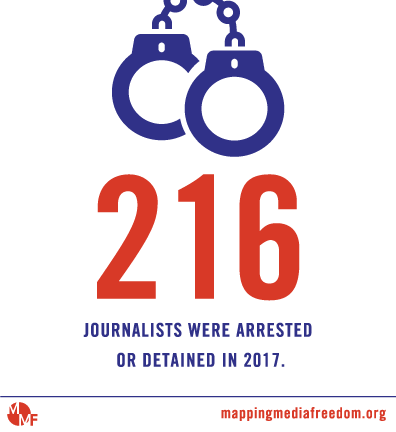 A total of 216 journalists were arrested or detained in 2017, including 21 in Azerbaijan. On 5 July Afgan Mukhtarli was kidnapped from Georgia, where he had lived in self-imposed exile for three years, and taken to Azerbaijan. While in prison, he suffered serious health problems and lost a significant amount of weight. In January 2018 he was sentenced to six years in prison by an Azerbaijani court.
A total of 216 journalists were arrested or detained in 2017, including 21 in Azerbaijan. On 5 July Afgan Mukhtarli was kidnapped from Georgia, where he had lived in self-imposed exile for three years, and taken to Azerbaijan. While in prison, he suffered serious health problems and lost a significant amount of weight. In January 2018 he was sentenced to six years in prison by an Azerbaijani court.
Mapping Media Freedom verified the arrest or detainment of 65 journalists in Russia throughout 2017. The majority of these took place during anti-corruption protests throughout the country organised by opposition figure Alexei Navalny in March and June.
By the close of 2017, 151 journalists were in prison in Turkey, making the country the largest jailer of journalists in the world. On 20 October police took five journalists working for the Kurdish Jin News and Mesopotamia agencies into custody: Jin News editor Sibel Yükler; Jin News reporters Duygu Erol and Habibe Eren; and Mezopotamya Agency reporters Diren Yurtsever and Selman Güzelyüz. Both agencies were launched in late September by staff from organisations shut down during Turkey’s state of emergency.
While only five media workers were arrested or detained in 2017 in the United Kingdom, one case stands out. On 7 December two Kurdish women and two 17-year-old boys were arrested at dawn by armed police in Alexandra Palace and in Crouch End, London. They were questioned about the sale and distribution of the Kurdish-language Yeni Ozgur Politika. All four were arrested on suspicion of funding terrorism, money laundering and fraud.
[/vc_column_text][vc_custom_heading text=”Criminal charges/civil lawsuits” use_theme_fonts=”yes”][vc_column_text]
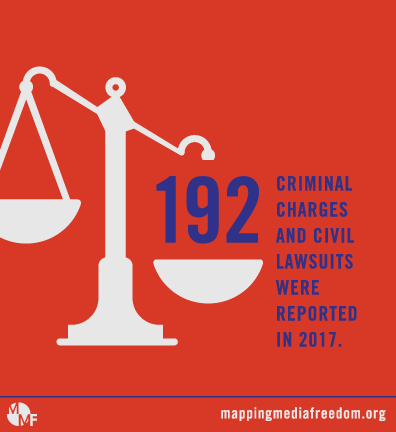 There were 192 cases of criminal charges or civil litigation reported to Mapping Media Freedom in 2017. In Italy, lawsuits demanding millions of euros in damages were filed throughout the year. In March Claudio Riva, former owner of the steelworks company Ilva, sued newspaper Gazzetta del Mezzogiorno for €2.2 million in damages, for publishing an article about pollution allegedly linked to the company’s operations in Taranto. Riva’s lawyers asked for €550,000 in compensation for each of the four damaged parties: Riva Forni Elettrici SPA, Claudio Riva, Fabio Arturo Riva and Nicola Riva. In October Il Locale News was sued for €1 million by Giancarlo Guarrera, an engineer and director of Airgest, the company that manages Trapani airport in Sicily. On 8 November 2016 Il Locale News featured an article on financial issues at Airgest.
There were 192 cases of criminal charges or civil litigation reported to Mapping Media Freedom in 2017. In Italy, lawsuits demanding millions of euros in damages were filed throughout the year. In March Claudio Riva, former owner of the steelworks company Ilva, sued newspaper Gazzetta del Mezzogiorno for €2.2 million in damages, for publishing an article about pollution allegedly linked to the company’s operations in Taranto. Riva’s lawyers asked for €550,000 in compensation for each of the four damaged parties: Riva Forni Elettrici SPA, Claudio Riva, Fabio Arturo Riva and Nicola Riva. In October Il Locale News was sued for €1 million by Giancarlo Guarrera, an engineer and director of Airgest, the company that manages Trapani airport in Sicily. On 8 November 2016 Il Locale News featured an article on financial issues at Airgest.
In Spain, wealthy businessman Alvaro de Marichalar filed legal action against freelance journalist Sabina Urraca in March, demanding she pay €30,000 in damages for an article she wrote after accompanying him on a trip. In July Hermann Tertsch, a columnist for daily newspaper ABC, was ordered by a court in Zamora to pay €12,000 to Javier Iglesias for “unlawfully offending the honour” of his father Manuel. Javier Iglesias is the father of Pablo Iglesias, the leader of the left-wing Podemos party, the third largest party in the Spanish parliament.
[/vc_column_text][vc_custom_heading text=”Legal measures” use_theme_fonts=”yes”][vc_column_text]
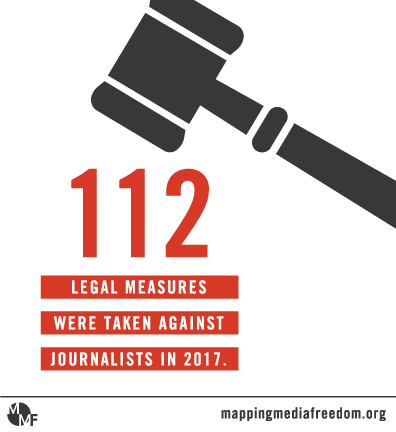 There were 112 legal measures taken against journalists in 2017. In the United Kingdom, the offshore company Appleby, which was at the heart of the Panama Papers scandal, launched breach of confidence proceedings against the Guardian and the BBC on 18 December, in an attempt to force them to disclose the documents used in the investigation. Appleby said the documents were stolen in a cyberattack and there was no public interest in the revealing of their contents.
There were 112 legal measures taken against journalists in 2017. In the United Kingdom, the offshore company Appleby, which was at the heart of the Panama Papers scandal, launched breach of confidence proceedings against the Guardian and the BBC on 18 December, in an attempt to force them to disclose the documents used in the investigation. Appleby said the documents were stolen in a cyberattack and there was no public interest in the revealing of their contents.
In February the UK government proposed extending jail time for journalists who have obtained leaked official documents to up to 14 years. The major overhaul of the Official Secrets Act – to be replaced by an updated Espionage Act – would give courts the power to increase jail terms against journalists receiving such material. Should the law get approval, documents containing “sensitive information” about the economy could fall foul of national security laws for the first time. Jodie Ginsberg, chief executive of Index on Censorship, said: “It is unthinkable that whistleblowers and those to whom they reveal their information should face jail for leaking and receiving information that is in the public interest.”
In November, after the US added several media outlets funded by the Russian state on a list of foreign agents, Russia adopted a new restrictive law against foreign media that allows such journalists and organisations to be recognised as foreign agents, which makes them subject to numerous additional checks and obliges them to mark their content as being produced by a foreign agent.
[/vc_column_text][vc_custom_heading text=”Job loss” use_theme_fonts=”yes”][vc_column_text]
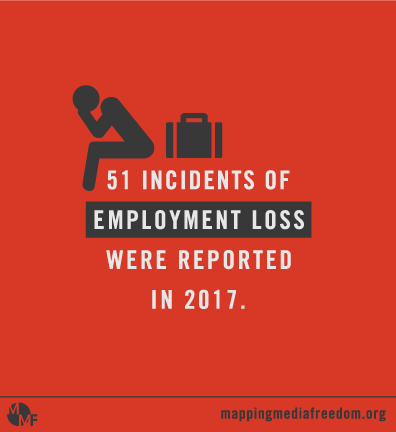 There were 51 reports of job loss recorded on Mapping Media Freedom throughout 2017, more than half of which came from Russia (13), Poland (8) and Spain (5).
There were 51 reports of job loss recorded on Mapping Media Freedom throughout 2017, more than half of which came from Russia (13), Poland (8) and Spain (5).
In Poland, Michał Fabisiak, a journalist for the public media outlet Polskie Radio, was fired for refusing to reveal the source of information for an article about an alleged internal survey in the Law and Justice (PiS) party, measuring support for potential PiS candidates in municipal elections in 2018.
Eleven days later, Barbara Burdzy, a Polish journalist for the public media outlet TVP Info, was dismissed after she published an article stating that the intelligence service, under the minister of defence Antoni Macierewicz, lied when claiming that deputy minister Jacek Kotas was not involved in property restoration in Warsaw.
On 14 December a documentary critical of Togo’s president was removed from the website of the French cable television channel Canal Plus and two employees of the channel were subsequently dismissed. Faure Gnassingbé, the president of Togo, is a friend of Vincent Bolloré, French businessman and chairman of Canal Plus’ parent company Vivendi. The documentary, entitled Let Go of the Throne, focused on ongoing protests against the country’s president. In November it was aired on Canal Afrique, a decision attributed to an employee who was later fired. François Deplanck, head of channels and content at Canal Plus International was also dismissed.
[/vc_column_text][vc_custom_heading text=”Intimidation” use_theme_fonts=”yes”][vc_column_text]
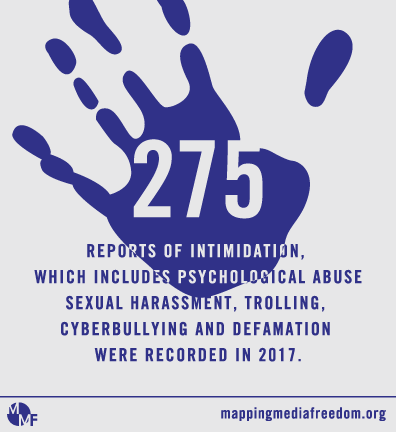 Intimidation was widespread across Europe in 2017, with 275 incidents reported to the map. In the United Kingdom, the BBC’s political editor Laura Kuenssberg was assigned a security detail at the Labour party conference in late September following online threats and abuse. The journalist attracted anger from some Labour supporters for her coverage of the 2016 Labour leadership race and the party’s poor performance in local elections, while a petition for her to be fired received 35,000 signatures.
Intimidation was widespread across Europe in 2017, with 275 incidents reported to the map. In the United Kingdom, the BBC’s political editor Laura Kuenssberg was assigned a security detail at the Labour party conference in late September following online threats and abuse. The journalist attracted anger from some Labour supporters for her coverage of the 2016 Labour leadership race and the party’s poor performance in local elections, while a petition for her to be fired received 35,000 signatures.
Kuenssberg — the first woman to lead political coverage at the public broadcaster — also reported that she had bolstered her security during the general election in June 2017 after receiving threats over her coverage of Labour Party leader Jeremy Corbyn.
[/vc_column_text][vc_custom_heading text=”Attacks to property” use_theme_fonts=”yes”][vc_column_text]
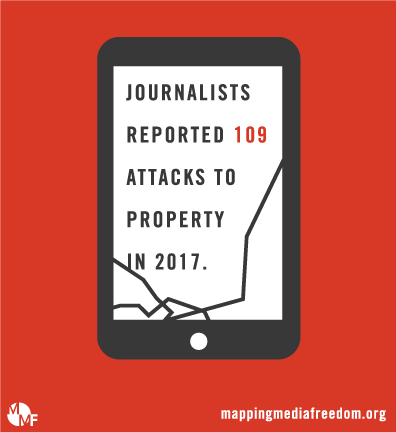 There were 109 attacks on the property of journalists in 2017. On the morning of 26 November Yulia Zavialova, editor-in-chief of the Russian investigative website Bloknot Volgograd, known for its coverage of political and business corruption, asked her father to have the tires on her car checked. Thirty minutes later he rang her to say the brakes were completely out of service. Her brakes had been cut and her anti-lock braking system was damaged. Zavialova called the police but, according to the journalist, they did not properly investigate the scene, failing to take fingerprints or full details of the damage.
There were 109 attacks on the property of journalists in 2017. On the morning of 26 November Yulia Zavialova, editor-in-chief of the Russian investigative website Bloknot Volgograd, known for its coverage of political and business corruption, asked her father to have the tires on her car checked. Thirty minutes later he rang her to say the brakes were completely out of service. Her brakes had been cut and her anti-lock braking system was damaged. Zavialova called the police but, according to the journalist, they did not properly investigate the scene, failing to take fingerprints or full details of the damage.
Supporters of the Italian far-right party Forza Nuova attacked the offices of the left-wing newspaper La Repubblica in Rome on 6 December. The party declared “war” on L’Espresso Group, the newspaper’s publisher, through a Facebook post. During the protest, Forza Nuova supporters threw flares at La Repubblica’s office while carrying a banner reading “Boycott L’Espresso and La Repubblica”. Members of the group read a statement denouncing journalists employed there.
[/vc_column_text][vc_custom_heading text=”Blocked access” use_theme_fonts=”yes”][vc_column_text]
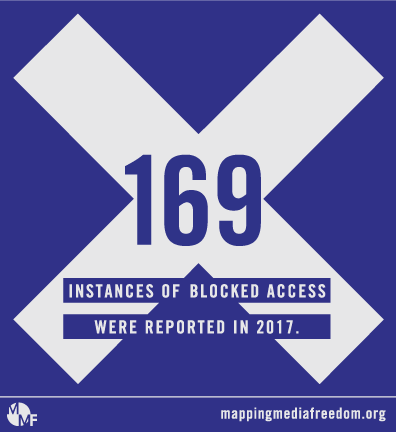 There were 169 confirmed cases of blocked access throughout Europe in 2017, in which journalists were expelled from a location or prevented from speaking to a source by way of obstruction. Many of these reports were connected to other violations, such as assault, damage to property and intimidation.
There were 169 confirmed cases of blocked access throughout Europe in 2017, in which journalists were expelled from a location or prevented from speaking to a source by way of obstruction. Many of these reports were connected to other violations, such as assault, damage to property and intimidation.
Throughout Europe, journalists were blocked from attending events by political parties, including the Labour Party’s annual conference in Brighton, United Kingdom, in September. Sussex police refused to grant Huck Magazine news editor Michael Segalov the security clearance he needed to attend. The journalist had applied for press accreditation three months prior but was informed on 19 September that it had been denied by police on security grounds. “Rather than provide reasons and rationale for our journalistic freedom being curtailed, the police said they would not divulge why they made their call,” Segalov wrote. The journalist has never been arrested, charged or convicted of a crime. Michael Walker, a journalist working for the left-wing Novara Media, was also barred by police from entering the conference.
On 25 October three journalists working for Echo TV in Hungary were banned from entering the country’s parliament. The parliament press office said the journalists had broken official rules multiple times by filming in areas closed to the media.
[/vc_column_text][vc_custom_heading text=”Work censored or altered” use_theme_fonts=”yes”][vc_column_text]
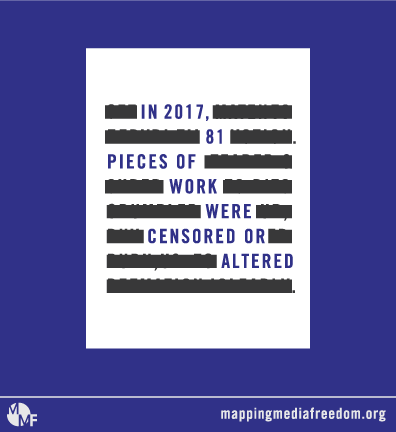 In 2017 Mapping Media Freedom documented 81 cases in which journalists had their work censored or altered. On 15 October in the city of Uppsala, Sweden, local newspaper UNT and public broadcaster SVT identified what they saw as a concerted effort by press officers at the local council to control statements made by staff to journalists. Both complained that press officers were exerting pressure on staff to change statements that reflect badly on the council.
In 2017 Mapping Media Freedom documented 81 cases in which journalists had their work censored or altered. On 15 October in the city of Uppsala, Sweden, local newspaper UNT and public broadcaster SVT identified what they saw as a concerted effort by press officers at the local council to control statements made by staff to journalists. Both complained that press officers were exerting pressure on staff to change statements that reflect badly on the council.
On 4 November the Spanish newspaper El País removed a column from its website that questioned and criticised allegations of sexual harassment in the film industry against the likes of Kevin Spacey, Harvey Weinstein and Roman Polanski.
On 19 December the Malta Independent, a Maltese newspaper and publishing house, announced it would remove some online content relating to a whistleblower at Pilatus Bank due to the threat of a multi-million euro lawsuit from the bank. Pilatus Bank first threatened the independent publishing house in mid-October, with lawsuits in the USA and United Kingdom.
[/vc_column_text][vc_separator color=”black” style=”dashed”][vc_column_text]
CASE STUDIES
2018 WATCH LIST
Index on Censorship is especially disturbed by the five countries on the map with over 60 violations in 2017. These are:
Russia (197)
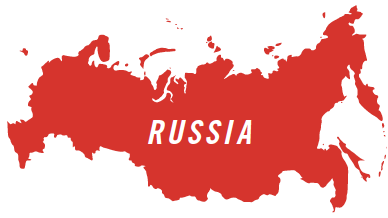 During protests organised by Russian lawyer and activist Alexei Navalny in March and June, 1,000 people were arrested, including 19 journalists, in Moscow, St. Petersburg, Makhachkala, Petrozavodsk and Samara. At a rally in Moscow on 26 March, police detained RBC correspondent Timofey Dzyadko, Mediazona publisher Piotr Verzilov, Open Russia correspondent Sofiko Arifdzhanova, Public Television of Russia journalist Olga Orlova, Echo of Moscow journalist Alexandr Pluschev and Kommersant-FM reporter Pyotr Parkhomenko. At the same rally, Guardian correspondent Alec Luhn was detained after he took a photo of a protester being arrested. He spent more than five hours at a police station without an explanation of why he was detained. Luhn was eventually charged with participating in an unsanctioned rally, even though he showed officers his press accreditation. At least nine media workers were detained across Russia on 8 October during further protests organised by Navalny.
During protests organised by Russian lawyer and activist Alexei Navalny in March and June, 1,000 people were arrested, including 19 journalists, in Moscow, St. Petersburg, Makhachkala, Petrozavodsk and Samara. At a rally in Moscow on 26 March, police detained RBC correspondent Timofey Dzyadko, Mediazona publisher Piotr Verzilov, Open Russia correspondent Sofiko Arifdzhanova, Public Television of Russia journalist Olga Orlova, Echo of Moscow journalist Alexandr Pluschev and Kommersant-FM reporter Pyotr Parkhomenko. At the same rally, Guardian correspondent Alec Luhn was detained after he took a photo of a protester being arrested. He spent more than five hours at a police station without an explanation of why he was detained. Luhn was eventually charged with participating in an unsanctioned rally, even though he showed officers his press accreditation. At least nine media workers were detained across Russia on 8 October during further protests organised by Navalny.
On 20 December photographers Andrey Zolotov and Denis Bochkarev, along with Maria Alyokhina, a member of punk collective Pussy Riot, were detained during a protest at the entrance of the FSB, the Russian federal security service. All three were taken to the nearest police station, where Alyokhina and Bochkaryov spent the night ahead of an administrative hearing.
Often referred to as the only independent radio station in Russia, Echo Moskvy was subjected to significant pressure and harassment throughout 2017, with Mapping Media Freedom verifying 15 reports against the station including one radio host stabbed, two journalists fleeing the country after threats, several detained and an American company forced to withdraw funding from the station.
Turkey
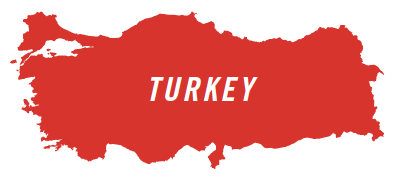 Although the number of violations reported to Mapping Media Freedom that took place in Turkey decreased between 2016 and 2017 — from 231 to 135 — the country remains the number one jailer of journalists in the world with 151 media workers behind bars by the end of 2017. In all, 65 journalists were jailed and sentenced on charges including the spreading of terrorist propaganda. At the trial of journalist Nedim Türfent, who reported on security operations in Turkey’s Kurdish majority provinces, at least a dozen people claimed they were tortured by police.
Although the number of violations reported to Mapping Media Freedom that took place in Turkey decreased between 2016 and 2017 — from 231 to 135 — the country remains the number one jailer of journalists in the world with 151 media workers behind bars by the end of 2017. In all, 65 journalists were jailed and sentenced on charges including the spreading of terrorist propaganda. At the trial of journalist Nedim Türfent, who reported on security operations in Turkey’s Kurdish majority provinces, at least a dozen people claimed they were tortured by police.
In November, Turkish journalists Ahmet Altan and Mehmet Altan’s defence attorneys were forced to leave the courtroom as their clients stood trial, accused of taking part in Turkey’s failed 2016 coup. Both brothers are prominent Turkish journalists, known for their critical reporting on president Erdogan’s regime. Without lawyers present, the court then ruled that the Altan brothers — along with four other journalists — would remain in pretrial detention. On 16 February 2018 they were sentenced to aggravated life sentences.
Belarus
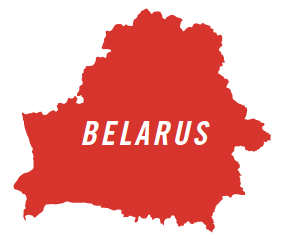 A total of 92 violations of media freedom were recorded in Belarus throughout 2017, including the detainment of 101 journalists. In all, 30 journalists received criminal charges. A wave of detentions occurred on the Belarusian holiday Freedom Day on 25 March, when 36 journalists were placed in custody. Olga Morva, Philip Warwick, Andrey Dubinin, Valery Shchukin, Katsiaryna Bakhvalava, Ihar Ilyash and Volha Davydava said they were beaten by police while under arrest. Warwick, from the United Kingdom, said he was denied the right to contact his embassy after being handcuffed and hit in the face; he spent over six hours at the police station. The apartment of journalist Maryna Kastylyanchanka, who works with human rights organisations, was searched. She was later jailed for 15 days for disobeying police and participating in the unsanctioned mass protests.
A total of 92 violations of media freedom were recorded in Belarus throughout 2017, including the detainment of 101 journalists. In all, 30 journalists received criminal charges. A wave of detentions occurred on the Belarusian holiday Freedom Day on 25 March, when 36 journalists were placed in custody. Olga Morva, Philip Warwick, Andrey Dubinin, Valery Shchukin, Katsiaryna Bakhvalava, Ihar Ilyash and Volha Davydava said they were beaten by police while under arrest. Warwick, from the United Kingdom, said he was denied the right to contact his embassy after being handcuffed and hit in the face; he spent over six hours at the police station. The apartment of journalist Maryna Kastylyanchanka, who works with human rights organisations, was searched. She was later jailed for 15 days for disobeying police and participating in the unsanctioned mass protests.
Throughout the year, 69 fines were administered to journalists for violating Article 22.9 of Belarus’ Code of Administrative Offences on the illegal production and/or distribution of media content.
Ukraine
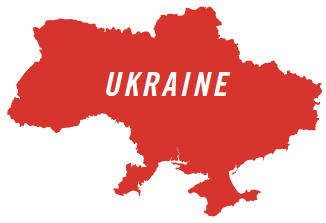 In all, 74 violations against the media in Ukraine were reported to Mapping Media Freedom in 2017. One of the most worrying trends included the treatment of foreign journalists or journalists working for Russian companies. Sixteen journalists were expelled from, or not allowed to enter the country, including some who worked for Russian state media outlets. There were three cases involving the abuse of Interpol warrants to arrest or detain foreign journalists in Ukraine by their countries of origin as a means of silencing critical voices. These were: Azerbaijan, Uzbekistan and Kazakhstan. Three journalists were arrested in territory controlled by self-proclaimed separatists in 2017, including Ukrainian blogger and writer Stanyslav Aseev, one of the few journalists contributing to western and independent media outlets in eastern Ukraine.
In all, 74 violations against the media in Ukraine were reported to Mapping Media Freedom in 2017. One of the most worrying trends included the treatment of foreign journalists or journalists working for Russian companies. Sixteen journalists were expelled from, or not allowed to enter the country, including some who worked for Russian state media outlets. There were three cases involving the abuse of Interpol warrants to arrest or detain foreign journalists in Ukraine by their countries of origin as a means of silencing critical voices. These were: Azerbaijan, Uzbekistan and Kazakhstan. Three journalists were arrested in territory controlled by self-proclaimed separatists in 2017, including Ukrainian blogger and writer Stanyslav Aseev, one of the few journalists contributing to western and independent media outlets in eastern Ukraine.
Ukrainian president Petro Poroshenko signed a National Security and Defence Council decree in May that banned a number of Russian social media sites such as VKontakte and Odnoklassniki, along with the search engine Yandex and email service Mail.ru.
“The lack of safety for journalists in Ukraine, whether direct attacks or obstruction, remains a problem, and the level of response by the authorities is telling because too often the perpetrators go unpunished,” Vitalii Atanasov, Mapping Media Freedom correspondent for Ukraine, said. “The murder of prominent journalist Pavel Sheremet in July 2016 has not yet been properly investigated, while media workers continue to face pressure from the authorities, politicians and other influential actors. It is important to emphasise to that while the Mapping Media Freedom reflects the most disturbing and characteristic cases, it does not claim to be complete.”
Spain
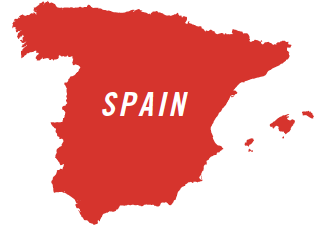 Between 2016 and 2017, media freedom violations in Spain increased from 56 to 66. Journalists experienced difficulties before, during and after the referendum on Catalan independence on 1 October. In July the daily newspaper La Vanguardia, based in Barcelona, refused to publish a column written by Gregorio Morán in which the journalist criticised the “corrupt” regional government of Catalonia. Morán also accused the Catalan media of receiving sums of public money, adding that it was therefore no surprise to see them supporting Catalan independence.
Between 2016 and 2017, media freedom violations in Spain increased from 56 to 66. Journalists experienced difficulties before, during and after the referendum on Catalan independence on 1 October. In July the daily newspaper La Vanguardia, based in Barcelona, refused to publish a column written by Gregorio Morán in which the journalist criticised the “corrupt” regional government of Catalonia. Morán also accused the Catalan media of receiving sums of public money, adding that it was therefore no surprise to see them supporting Catalan independence.
On the day of the referendum Mapping Media Freedom recorded five separate violations of media freedom. Journalists were among the many victims of violence by heavy-handed police deployed the Spanish government, who declared the referendum to be illegal. Xabi Barrena, a journalist for the newspaper El Periódico, was assaulted by Spanish national police while reporting on voters being evicted from a polling station in Barcelona. He was struck with a baton, knocked to the ground and kicked by police.
In the days following the referendum, media violations were widespread during the protests that swept parts of the country. On 2 October, for example, Ana Cuesta and José Yelámo, reporters for television La Sexta, were surrounded by protesters who chanted “Spanish press manipulators” and “assassins” during live coverage.
[/vc_column_text][vc_column_text]
TRENDS
Threats from the far-right
The far right has a record of violating freedom of the press throughout Europe, with 24 media violations across 13 countries involving far-right groups or activists in 2017.
Twelve attempts were made by the far-right to intimidate media workers. At the start of December, the Serbian journalist Marija Antic, a television host for the broadcaster N1, received death and rape threats on social media after interviewing a French-Serbian far-right activist. Antic had invited Arnaud Gouillon, who is known for his support for Serbs in Kosovo, to her talk show. During the interview, Antic asked him about his past involvement in the French far-right group Les Identitaires and about his connections with far-right Serbian groups after he attended some of their events. After the interview, Gouillon accused Antic of demonising him. Soon after, Antic received multiple threats on social media.
On six occasions, far-right groups attempted to defame journalists throughout Europe. This was the case on 15 March when Stina Blomgren, a Swedish journalist working for the state broadcaster SVT, was accused by the popular Swedish-Russian far-right blogger Egor Putilov of lying and creating fake reports about the risks Syrian migrants faced when trying to reach Sweden. Putilov claimed to have visited Egypt and uncovered inaccuracies in an article published by Blomgren in August.
In 2017 four reports made to Mapping Media Freedom involved violence from the far right and four involved attacks to property. These ranged from damages to camera equipment to an assault with a metal pipe.
Corruption
Corruption is a major issue in the EU and neighbouring countries, undermining democracy and putting people at risk. Journalists play a key role in uncovering and fighting corruption through their investigations and, as a result, put themselves in danger. In all, 67 cases of media workers facing difficulty in their reporting on corruption were recorded throughout 2017.
On 16 August, for instance, Parim Olluri, editor-in-chief of investigative website Insajderi, was physically assaulted by unknown individuals outside his home in Kosovo’s capital Pristina. Olluri believes the attack was linked to his work. A few days before the assault, Olluri had published an editorial about corruption allegations against former Kosovo Liberation Army commanders, after which he received a torrent of abuse and threats on social media.
On 16 October the Maltese journalist Daphne Caruana Galizia was murdered when the car she was driving exploded. On 11 March Silvio Debono, owner of real estate investment company DB Group, filed 19 libel cases against her. Caruana Galizia published a number of articles on her blog discussing a business deal between the developer and Malta’s government to take over a tract of public land on which he had planned to build a Hard Rock Hotel and two towers of flats for sale. Caruana Galizia also conducted an investigation allegedly linking prime minister Joseph Muscat and his wife to the Panama Papers scandal.
Harassment of female journalists
Mapping Media Freedom logged 10 cases where women journalists reported they suffered sexual harassment throughout 2017, from politicians, anonymous sources and fellow journalists alike. In February the Swedish newspaper journalist Evelyn Schreiber was subjected to persistent death threats and threats of sexual violence after questioning local police officer a Peter Springare’s assertion that immigrants were responsible for a spike in violent crime in Örebro, Sweden. Within 24 hours of her report, Schreiber received over 200 emails containing threats.
On 7 May Loes Reijmer, a journalist and columnist for the Dutch daily newspaper De Volkskrant, faced abuse after the popular right-wing blog GeenStijl published a photo of her with the text: “Would you do her?” Thousands of readers responded in the comments section, many containing sexual references and rape threats. Reijmer had published several articles critical of GeenStijl, which is owned by Telegraaf Media Group and is one of the top 10 most popular news sites in the Netherlands.
On 30 November, Dzenan Selimbegovic, a deputy secretary general of the presidency of Bosnia and Herzegovina, used offensive language to describe Sanele Prašović Gadžo, a journalist for the public broadcaster BHT, and Arijana Saračević-Helać, a journalist for the public broadcaster FTV, in a Facebook post. The comments followed a trailer aired on BHT for Gadžo’s interview with Saračević-Helać on her talk show.
Commercial interference
In 2017 Index on Censorship added the “commercial interference” category to Mapping Media Freedom to monitor actions that use money and/or financial pressure to influence editorial decisions of a media or news outlet. One of the most concerning issues highlighted was the lack of plurality in media ownership in Ireland and the impact this can have on the public’s right to information.
Broadcasting in the country is dominated by just two organisations, RTÉ and Communicorp. Semi-state RTÉ services are the most popular on television and radio, while businessman Denis O’Brien’s Communicorp owns the largest commercial news radio stations – Newstalk and Today FM, among others. There is currently a lack of imperative for reform on the issue of the concentration of media ownership by the Irish government, leaving journalists open to further pressure and self-censorship to suit commercial interests, according to the National Union of Journalists.
Across Europe commercial interference in the media is proving to be a growing problem. On 6 December in Nantes, France, for example, managers of McDonald’s restaurants were asked to remove a page from local newspaper Ouest France that contained an article about litigation between the fast food restaurant chain and two of its workers, who had campaigned for union representation.
[/vc_column_text][vc_column_text]
CONCLUSIONS AND RECOMMENDATIONS
Mapping Media Freedom’s annual report highlights issues affecting the state of press freedom throughout Europe in 2017. Index on Censorship urges that the following steps be taken.
-
All journalists, media workers and others arrested for exercising their right to freedom of expression must be immediately and unconditionally released. We make this plea directly to the Turkish government in particular, which has become the largest jailer of journalists not just among the countries monitored by Mapping Media Freedom, but the entire world.
-
Laws designed to impinge on the work of journalists must be reconsidered, whether amended or abolished. This includes defamation laws, hate speech laws and terror and security-related legislation. Lawmakers should also ensure that new or revised laws do not encroach on the work of journalists.
-
Governments must respect the right of journalists to protect confidential information and sources. This is vital, especially in cases involving whistleblowing in the public interest.
-
Harassment and crimes against journalists must be properly investigated and those responsible should be prosecuted to prevent the further proliferation of impunity.
-
Governments should do more to ensure the protection of media workers who are women.
[/vc_column_text][vc_column_text]
[/vc_column_text][/vc_column][/vc_row][vc_row equal_height=”yes” css=”.vc_custom_1521129408155{background-color: #d5473c !important;}”][vc_column width=”1/2″][vc_custom_heading text=”Protect media freedom”][vc_column_text]
We monitor threats to press freedom, produce an award-winning magazine and publish work by censored writers.[/vc_column_text][/vc_column][vc_column width=”1/2″ css=”.vc_custom_1521129253575{background-image: url(https://www.indexoncensorship.org/wp-content/uploads/2018/03/MMF_2017_map-standalone.jpg?id=98665) !important;}”][/vc_column][/vc_row][vc_row][vc_column][vc_empty_space][/vc_column][/vc_row]
08 Feb 18 | Global Journalist, Media Freedom, News and features, Russia
[vc_row][vc_column][vc_single_image image=”97735″ img_size=”full” add_caption=”yes” alignment=”center”][vc_column_text]This article is part of Index on Censorship partner Global Journalist’s Project Exile series, which has published interviews with exiled journalists from around the world.[/vc_column_text][vc_column_text]Kseniya Kirillova thought her stay in the U.S. would be only temporary.
When she left her hometown of Ekaterinburg, Russia in the spring of 2014 to move to Seattle with her husband, a Ukrainian software engineer, she had little experience in international affairs.
But all that changed as Russia began to openly back separatists in eastern Ukraine, and eventually invaded and annexed the Crimean Peninsula. Kirillova, who had previously worked for Novaya Gazeta, an independent Russian newspaper known for its investigations of corruption and criticism of the Kremlin, was taken aback. She had many friends in Ukraine, and was determined to do all she could to counter what she saw as Russian propaganda that was feeding the war effort.
She began writing about Russian propaganda for the website Novy Region. Often critical of President Vladimir Putin, the site had been founded by a friend, Russian journalist Alexander Shchetinin. Shchetinin had founded the news outlet in the 1990s but was forced to leave the company under pressure from the Russian government in 2014. He later relaunched the site in Ukraine.
Kirillova wasn’t unfamiliar with the difficulties reporters face in challenging the Russian government. At least 58 journalists have been killed in Russia since 1993, according to the Committee to Protect Journalists. That includes several Novaya Gazeta journalists who were killed or died in mysterious circumstances since 2000.
Living in the U.S., was safe. But in August 2016, Shchetinin, who had called Putin his “personal enemy,” was found dead of a gunshot wound to the head in his apartment in Kiev. A suicide note was found near Shchetinin’s body. Kirillova doesn’t believe Shchetinin killed himself, and Ukrainian authorities opened a murder investigation.
Soon after Shchetinin’s death, Kirillova found a pro-Russia site online listing the names of “anti-Russia extremists.” Her name was on the list. A return to Russia, already dangerous, now seemed potentially deadly.
Today Kirillova, 33, lives in Oakland, Calif. and is a contributor to the Russian service of U.S.-backed Radio Free Europe/Radio Liberty as well as the Ukrainian broadcaster TCH. She spoke with Global Journalist’s Jiwon Choi about the death of her collaborator and her efforts to counter propaganda in Russian media.
Global Journalist: How has the conflict between Russia and Ukraine affected you?
Kirillova: All my problems in Russia started because of my activity in America. Before I came here, I worked for several years…for Novaya Gazeta in the Urals branch. I lived in my hometown Ekaterinburg. I came to America accidentally. My husband, who is a citizen of Ukraine, he had a temporary work contract in the U.S. At the same time, the Russian and Ukrainian war began [in] March 2014.
It was a real shock for me. I considered it my duty to do something, so I began to analyze Russian propaganda, [their] fears and their mentality. The main importance for me was if this information could prevent new Russian provocations around the world.
GJ: How has journalism in Russia changed in recent years?
Kirillova: When I was in Russia, I sometimes covered some dangerous topics. Before the war, Russian [media] was defending Putin’s regime, but not as aggressively as it is now. It wasn’t so hard to talk about the government. We [reporters could write about] corruption and tell the truth about political, social and other spheres. Local government authorities were independent from the federal.
In 2010, the government changed in my region. They created a united power system and added a position like a city monitor, who was appointed by the federal government. It became impossible to cover any social problems, because any problems have something to do with government officials. It became impossible to publish any critical articles.
GJ: When did you first hear that the Russian government was targeting you and Alexander?
Kirillova: My close friend Alexander Shchetinin warned me that both of us would be charged with state treason. It was in in the spring of 2015. Russian authorities were accusing even ordinary people who didn’t have any access to state secrets, including simple housewives and saleswomen. The Russian Supreme Court recognized [Nova Region] as an extremist site only because it was in Ukraine and was opposed to Russian aggression. Thus, we officially became journalists of an “extremist” resource.
The Russian authorities instituted criminal proceedings against my friends, Russian dissidents from Ekaterinburg, even for innocent posts in social networks condemning the war. Thus, we already understood that a criminal case was waiting for us in Russia.
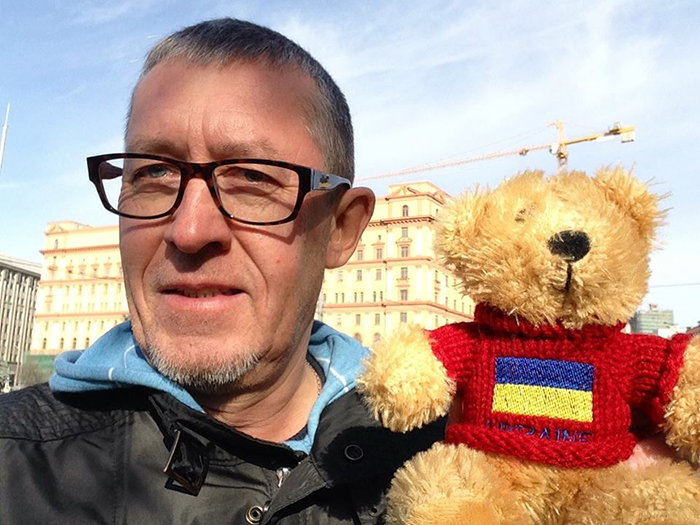
Russian journalist Alexander Shchetinin, pictured in front of the former headquarters of the KGB in Moscow with a stuffed bear.
GJ: How did you feel when you learned that Alexander was dead?
Kirillova: Alexander was someone who made the same choice as me – supporting Ukraine as a Russian journalist. Before his death, he lost most of his business, couldn’t visit his family and his adult children in Russia. He fought against Russian propaganda and agents of Russian influence in Ukraine.
I don’t believe that it was a suicide. He died a month after the murder of another Russian opposition journalist in Kiev, Pavel Sheremet. After the strange death of Alexander in Kiev, I found an article on an official Russian propaganda website which was later removed. It said that all Russian journalists who support Ukraine might be killed. My name was on the list.
GJ: What is the most difficult part of living in exile in the United States?
Kirillova: For a long time, I didn’t even have a work permit in the U.S. I was waiting for asylum [for] two years, even before the murder of Alexander. I was working for two years as a volunteer, without any payment. Now everything is fine, I have a work permit.
I lost everything because of my decision–I don’t mean the decision to come here, but the decision to start this work. But I never had illusions about this topic. [/vc_column_text][/vc_column][/vc_row][vc_row][vc_column width=”1/2″][vc_video link=”https://youtu.be/tOxGaGKy6fo”][/vc_column][vc_column width=”1/2″][vc_column_text]Index on Censorship partner Global Journalist is a website that features global press freedom and international news stories as well as a weekly radio program that airs on KBIA, mid-Missouri’s NPR affiliate, and partner stations in six other states. The website and radio show are produced jointly by professional staff and student journalists at the University of Missouri’s School of Journalism, the oldest school of journalism in the United States. [/vc_column_text][/vc_column][/vc_row][vc_row][vc_column][vc_custom_heading text=”Don’t lose your voice. Stay informed.” use_theme_fonts=”yes”][vc_separator color=”black”][vc_row_inner][vc_column_inner width=”1/2″][vc_column_text]Index on Censorship is a nonprofit that campaigns for and defends free expression worldwide. We publish work by censored writers and artists, promote debate, and monitor threats to free speech. We believe that everyone should be free to express themselves without fear of harm or persecution – no matter what their views.
Join our mailing list (or follow us on Twitter or Facebook) and we’ll send you our weekly newsletter about our activities defending free speech. We won’t share your personal information with anyone outside Index.[/vc_column_text][/vc_column_inner][vc_column_inner width=”1/2″][gravityform id=”20″ title=”false” description=”false” ajax=”false”][/vc_column_inner][/vc_row_inner][vc_separator color=”black”][/vc_column][/vc_row][vc_row][vc_column][vc_basic_grid post_type=”post” max_items=”6″ style=”load-more” items_per_page=”2″ element_width=”12″ grid_id=”vc_gid:1516813685289-3cea7194-74a5-4″ taxonomies=”22142″][/vc_column][/vc_row]
![]() SUBSCRIBE NOW[/vc_column_text][/vc_column][/vc_row]
SUBSCRIBE NOW[/vc_column_text][/vc_column][/vc_row] Six journalists were killed as a result of their reporting in 2017.
Six journalists were killed as a result of their reporting in 2017.  Mapping Media Freedom documented 175 verified incidents of assault and injury, 109 of which occurred in just five countries: Russia (47), Spain (19), Ukraine (18), Italy (15) and France (10).
Mapping Media Freedom documented 175 verified incidents of assault and injury, 109 of which occurred in just five countries: Russia (47), Spain (19), Ukraine (18), Italy (15) and France (10).  A total of 216 journalists were arrested or detained in 2017, including 21 in Azerbaijan. On 5 July Afgan Mukhtarli was kidnapped from Georgia, where he had lived in self-imposed exile for three years, and taken to Azerbaijan. While in prison, he suffered serious health problems and lost a significant amount of weight. In January 2018 he was sentenced to six years in prison by an Azerbaijani court.
A total of 216 journalists were arrested or detained in 2017, including 21 in Azerbaijan. On 5 July Afgan Mukhtarli was kidnapped from Georgia, where he had lived in self-imposed exile for three years, and taken to Azerbaijan. While in prison, he suffered serious health problems and lost a significant amount of weight. In January 2018 he was sentenced to six years in prison by an Azerbaijani court.  There were 192 cases of criminal charges or civil litigation reported to Mapping Media Freedom in 2017. In Italy, lawsuits demanding millions of euros in damages were filed throughout the year. In March Claudio Riva, former owner of the steelworks company Ilva, sued newspaper Gazzetta del Mezzogiorno for €2.2 million in damages, for publishing an article about pollution allegedly linked to the company’s operations in Taranto. Riva’s lawyers asked for €550,000 in compensation for each of the four damaged parties: Riva Forni Elettrici SPA, Claudio Riva, Fabio Arturo Riva and Nicola Riva. In October Il Locale News was sued for €1 million by Giancarlo Guarrera, an engineer and director of Airgest, the company that manages Trapani airport in Sicily. On 8 November 2016 Il Locale News featured an article on financial issues at Airgest.
There were 192 cases of criminal charges or civil litigation reported to Mapping Media Freedom in 2017. In Italy, lawsuits demanding millions of euros in damages were filed throughout the year. In March Claudio Riva, former owner of the steelworks company Ilva, sued newspaper Gazzetta del Mezzogiorno for €2.2 million in damages, for publishing an article about pollution allegedly linked to the company’s operations in Taranto. Riva’s lawyers asked for €550,000 in compensation for each of the four damaged parties: Riva Forni Elettrici SPA, Claudio Riva, Fabio Arturo Riva and Nicola Riva. In October Il Locale News was sued for €1 million by Giancarlo Guarrera, an engineer and director of Airgest, the company that manages Trapani airport in Sicily. On 8 November 2016 Il Locale News featured an article on financial issues at Airgest.  There were 112 legal measures taken against journalists in 2017. In the United Kingdom, the offshore company Appleby, which was at the heart of the Panama Papers scandal, launched breach of confidence proceedings against the Guardian and the BBC on 18 December, in an attempt to force them to disclose the documents used in the investigation. Appleby said the documents were stolen in a cyberattack and there was no public interest in the revealing of their contents.
There were 112 legal measures taken against journalists in 2017. In the United Kingdom, the offshore company Appleby, which was at the heart of the Panama Papers scandal, launched breach of confidence proceedings against the Guardian and the BBC on 18 December, in an attempt to force them to disclose the documents used in the investigation. Appleby said the documents were stolen in a cyberattack and there was no public interest in the revealing of their contents. There were 51 reports of job loss recorded on Mapping Media Freedom throughout 2017, more than half of which came from Russia (13), Poland (8) and Spain (5).
There were 51 reports of job loss recorded on Mapping Media Freedom throughout 2017, more than half of which came from Russia (13), Poland (8) and Spain (5).  Intimidation was widespread across Europe in 2017, with 275 incidents reported to the map. In the United Kingdom, the BBC’s political editor Laura Kuenssberg was assigned a security detail at the Labour party conference in late September following online threats and abuse. The journalist attracted anger from some Labour supporters for her coverage of the 2016 Labour leadership race and the party’s poor performance in local elections, while a petition for her to be fired received 35,000 signatures.
Intimidation was widespread across Europe in 2017, with 275 incidents reported to the map. In the United Kingdom, the BBC’s political editor Laura Kuenssberg was assigned a security detail at the Labour party conference in late September following online threats and abuse. The journalist attracted anger from some Labour supporters for her coverage of the 2016 Labour leadership race and the party’s poor performance in local elections, while a petition for her to be fired received 35,000 signatures. There were 109 attacks on the property of journalists in 2017. On the morning of 26 November Yulia Zavialova, editor-in-chief of the Russian investigative website Bloknot Volgograd, known for its coverage of political and business corruption, asked her father to have the tires on her car checked. Thirty minutes later he rang her to say the brakes were completely out of service. Her brakes had been cut and her anti-lock braking system was damaged. Zavialova called the police but, according to the journalist, they did not properly investigate the scene, failing to take fingerprints or full details of the damage.
There were 109 attacks on the property of journalists in 2017. On the morning of 26 November Yulia Zavialova, editor-in-chief of the Russian investigative website Bloknot Volgograd, known for its coverage of political and business corruption, asked her father to have the tires on her car checked. Thirty minutes later he rang her to say the brakes were completely out of service. Her brakes had been cut and her anti-lock braking system was damaged. Zavialova called the police but, according to the journalist, they did not properly investigate the scene, failing to take fingerprints or full details of the damage. There were 169 confirmed cases of blocked access throughout Europe in 2017, in which journalists were expelled from a location or prevented from speaking to a source by way of obstruction. Many of these reports were connected to other violations, such as assault, damage to property and intimidation.
There were 169 confirmed cases of blocked access throughout Europe in 2017, in which journalists were expelled from a location or prevented from speaking to a source by way of obstruction. Many of these reports were connected to other violations, such as assault, damage to property and intimidation.  In 2017 Mapping Media Freedom documented 81 cases in which journalists had their work censored or altered. On 15 October in the city of Uppsala, Sweden, local newspaper UNT and public broadcaster SVT identified what they saw as a concerted effort by press officers at the local council to control statements made by staff to journalists. Both complained that press officers were exerting pressure on staff to change statements that reflect badly on the council.
In 2017 Mapping Media Freedom documented 81 cases in which journalists had their work censored or altered. On 15 October in the city of Uppsala, Sweden, local newspaper UNT and public broadcaster SVT identified what they saw as a concerted effort by press officers at the local council to control statements made by staff to journalists. Both complained that press officers were exerting pressure on staff to change statements that reflect badly on the council. During protests organised by Russian lawyer and activist Alexei Navalny in March and June, 1,000 people were arrested, including 19 journalists, in Moscow, St. Petersburg, Makhachkala, Petrozavodsk and Samara. At a rally in Moscow on 26 March, police detained RBC correspondent Timofey Dzyadko, Mediazona publisher Piotr Verzilov, Open Russia correspondent Sofiko Arifdzhanova, Public Television of Russia journalist Olga Orlova, Echo of Moscow journalist Alexandr Pluschev and Kommersant-FM reporter Pyotr Parkhomenko. At the same rally, Guardian correspondent Alec Luhn was detained after he took a photo of a protester being arrested. He spent more than five hours at a police station without an explanation of why he was detained. Luhn was eventually charged with participating in an unsanctioned rally, even though he showed officers his press accreditation. At least nine media workers were detained across Russia on 8 October during further protests organised by Navalny.
During protests organised by Russian lawyer and activist Alexei Navalny in March and June, 1,000 people were arrested, including 19 journalists, in Moscow, St. Petersburg, Makhachkala, Petrozavodsk and Samara. At a rally in Moscow on 26 March, police detained RBC correspondent Timofey Dzyadko, Mediazona publisher Piotr Verzilov, Open Russia correspondent Sofiko Arifdzhanova, Public Television of Russia journalist Olga Orlova, Echo of Moscow journalist Alexandr Pluschev and Kommersant-FM reporter Pyotr Parkhomenko. At the same rally, Guardian correspondent Alec Luhn was detained after he took a photo of a protester being arrested. He spent more than five hours at a police station without an explanation of why he was detained. Luhn was eventually charged with participating in an unsanctioned rally, even though he showed officers his press accreditation. At least nine media workers were detained across Russia on 8 October during further protests organised by Navalny. Although the number of violations reported to Mapping Media Freedom that took place in Turkey decreased between 2016 and 2017 — from 231 to 135 — the country remains the number one jailer of journalists in the world with 151 media workers behind bars by the end of 2017. In all, 65 journalists were jailed and sentenced on charges including the spreading of terrorist propaganda. At the trial of journalist Nedim Türfent, who reported on security operations in Turkey’s Kurdish majority provinces, at least a dozen people claimed they were tortured by police.
Although the number of violations reported to Mapping Media Freedom that took place in Turkey decreased between 2016 and 2017 — from 231 to 135 — the country remains the number one jailer of journalists in the world with 151 media workers behind bars by the end of 2017. In all, 65 journalists were jailed and sentenced on charges including the spreading of terrorist propaganda. At the trial of journalist Nedim Türfent, who reported on security operations in Turkey’s Kurdish majority provinces, at least a dozen people claimed they were tortured by police. A total of 92 violations of media freedom were recorded in Belarus throughout 2017, including the detainment of 101 journalists. In all, 30 journalists received criminal charges. A wave of detentions occurred on the Belarusian holiday Freedom Day on 25 March, when 36 journalists were placed in custody. Olga Morva, Philip Warwick, Andrey Dubinin, Valery Shchukin, Katsiaryna Bakhvalava, Ihar Ilyash and Volha Davydava said they were beaten by police while under arrest. Warwick, from the United Kingdom, said he was denied the right to contact his embassy after being handcuffed and hit in the face; he spent over six hours at the police station. The apartment of journalist Maryna Kastylyanchanka, who works with human rights organisations, was searched. She was later jailed for 15 days for disobeying police and participating in the unsanctioned mass protests.
A total of 92 violations of media freedom were recorded in Belarus throughout 2017, including the detainment of 101 journalists. In all, 30 journalists received criminal charges. A wave of detentions occurred on the Belarusian holiday Freedom Day on 25 March, when 36 journalists were placed in custody. Olga Morva, Philip Warwick, Andrey Dubinin, Valery Shchukin, Katsiaryna Bakhvalava, Ihar Ilyash and Volha Davydava said they were beaten by police while under arrest. Warwick, from the United Kingdom, said he was denied the right to contact his embassy after being handcuffed and hit in the face; he spent over six hours at the police station. The apartment of journalist Maryna Kastylyanchanka, who works with human rights organisations, was searched. She was later jailed for 15 days for disobeying police and participating in the unsanctioned mass protests. In all, 74 violations against the media in Ukraine were reported to Mapping Media Freedom in 2017. One of the most worrying trends included the treatment of foreign journalists or journalists working for Russian companies. Sixteen journalists were expelled from, or not allowed to enter the country, including some who worked for Russian state media outlets. There were three cases involving the abuse of Interpol warrants to arrest or detain foreign journalists in Ukraine by their countries of origin as a means of silencing critical voices. These were: Azerbaijan, Uzbekistan and Kazakhstan. Three journalists were arrested in territory controlled by self-proclaimed separatists in 2017, including Ukrainian blogger and writer Stanyslav Aseev, one of the few journalists contributing to western and independent media outlets in eastern Ukraine.
In all, 74 violations against the media in Ukraine were reported to Mapping Media Freedom in 2017. One of the most worrying trends included the treatment of foreign journalists or journalists working for Russian companies. Sixteen journalists were expelled from, or not allowed to enter the country, including some who worked for Russian state media outlets. There were three cases involving the abuse of Interpol warrants to arrest or detain foreign journalists in Ukraine by their countries of origin as a means of silencing critical voices. These were: Azerbaijan, Uzbekistan and Kazakhstan. Three journalists were arrested in territory controlled by self-proclaimed separatists in 2017, including Ukrainian blogger and writer Stanyslav Aseev, one of the few journalists contributing to western and independent media outlets in eastern Ukraine. Between 2016 and 2017, media freedom violations in Spain increased from 56 to 66. Journalists experienced difficulties before, during and after the referendum on Catalan independence on 1 October. In July the daily newspaper La Vanguardia, based in Barcelona, refused to publish a column written by Gregorio Morán in which the journalist criticised the “corrupt” regional government of Catalonia. Morán also accused the Catalan media of receiving sums of public money, adding that it was therefore no surprise to see them supporting Catalan independence.
Between 2016 and 2017, media freedom violations in Spain increased from 56 to 66. Journalists experienced difficulties before, during and after the referendum on Catalan independence on 1 October. In July the daily newspaper La Vanguardia, based in Barcelona, refused to publish a column written by Gregorio Morán in which the journalist criticised the “corrupt” regional government of Catalonia. Morán also accused the Catalan media of receiving sums of public money, adding that it was therefore no surprise to see them supporting Catalan independence. 